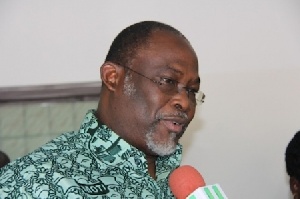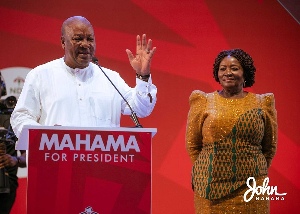The Minister of Trade and Industry Dr Ekwow Spio-Garbrah has called for the establishment of a Palm Oil Development Board (PODB) to oversee policies, regulations, and possible legislations in the industry.
Speaking at the official launch of the Oil Palm Development Association of Ghana (OPDAG) in Accra, Dr Spio-Garbrah said a first step would be a Palm oil stakeholder’s forum to analyse and outline the needs of the various actors, including funding options.
The forum would also scrutinise the growth paths of countries such as Brazil, Malaysia, Indonesia and Ivory Coast to guide the mandate of the PODB and the oil palm value chain to drive growth.
The OPDAG, launched with the support of SoIidaridad West Africa, aims to effectively promote the growth and development of the sector.
According to the Food and Agriculture Organisation (FAO) world production of palm oil is expected to increase from 45 million tonnes to about 60 million tonnes by 2020.
Africa, which holds 30 per cent of all oil palm agricultural lands, regrettably produces less than 10 per cent of the total world production of palm oil, with Ghana contributing distantly under 1 per cent (0, 8 per cent).
In Ghana, an estimated total land area of 305,758 hectares is cropped to oil palm with a production level of palm oil under 300,000mt, leaving a supply deficit of 35,000mt.
Dr Spio-Garbrah said with increasing demand trends especially in the healthcare, pharmaceutical and body lotion industries, the deficit could hit more than 100,000mt in the not too distant future.
In the West Africa sub-region, total crude palm oil market demand stands at approximately 1.6 million mt.
However, aggregated capacity in the Region approximately stands at 800,000 mt, leaving an estimated supply gap growing well beyond 850,000 mt.
“I must say that these supply short falls and the breadth of palm oil base products, such as laundry products, soap, domestic and industrial oils and cosmetics, jointly provide a significant growth opportunity for the oil palm industry in Ghana,” he said.
Dr Spio-Garbrah said because of the prospects of the oil palm sector the Ministry of Trade and Industry initiated and supported many programmes to engender plantation expansion and increased palm oil production for accelerated industrial growth.
By the end of 2010, approximately 40 - 45,000 hectares had been developed under the plantation expansion programme that was then known as the PSI-Palm Oil.
He said, the anticipated benefits of the programme have not been fully achieved owing principally to the inefficient coordination of actors within the palm oil value chain and the nascent state of downstream businesses.
He said the Ministry is optimistic that the palm oil industry would play a significant role in improving the country’s balance of payments while creating job opportunities with massive rural employment.
It is in this regard that palm oil was placed prominently among the 11 non-traditional export commodities and services selected in the National Export Strategy.
He pledged the Ministry’s support for the Oil Palm Development Association of Ghana, adding the Ministry would work with other stakeholders to transform the oil palm industry.
Mr Samuel Avaala, President of the OPDAG, said to ensure the promotion and development of the oil palm industry, the Association would undertake strong consultations and advocacy work to ensure that land acquisition, which is a major constraint to production, becomes attractive to investors and growers to expand their production.
He said the Association would promote the adoption of best management practices by smallholder farmers to increase their farm yields and also ensure the farmers adhere to the approved sustainable agricultural practices.
Business News of Friday, 17 April 2015
Source: GNA













